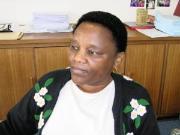
It breaks Eusebius McKaiser’s heart that a six-year-old black girl wishes to be a white woman when she grows up.
Johannesburg - A friend told me a fascinating story the other day. His sister teaches at a primary school in Bloemfontein, where she looks after an energetic bunch of Grade 1 pupils. And who can’t help love the little ones’ zest for life? I am surprised more of us don’t work with young children to keep our cynicism at bay.
As is compulsory, just like in scenes from movies in which school kids feature, she found herself asking them one day: “What do you want to be when you grow up?”
A precocious little black girl, of about six years old, put up her eager hand. “I want to be a white woman when I grow up!”
Wow. Talk about a lesson stopper right there! I had to ask him to tell the story again just to confirm that it wasn’t a lame joke. He assured me, sadly, that it was a true story.
Tragicomic, but wholly true.
When the teacher asked the child’s mother where on earth this might have come from, she was puzzled. The child is young, and the family is poor. The mother doesn’t spend a lot of time with the child to be planting such thoughts in her head as she works long hours.
So the teacher probed a little further on another occasion when she chatted with the girl in her class again. She used some fake enthusiasm so as not to make the little girl feel bad about her answer, but still asked why she wanted to be a white woman when she grew up.
Her further response? “White women are rich!” she said.
It turns out that the mom is a domestic worker and works for a white family in Bloemfontein, and the little girl had been to her mom’s workplace several times.
That was the basis of her dream that she, too, might one day be a white woman, her mom’s boss.
She would rather be madam than poor black mom.
I find this story very sad. Poverty and inequality are all too familiar to us South Africans. That’s not news to a reader of this column. But doesn’t it break your heart that a six-year-old wishes to wake up in an adult body with a different skin colour?
In that precious little girl’s mind, being black is synonymous with poverty, and being white is synonymous with wealth. She observes and experiences poverty and wealth in racial terms. And she volunteered, as a kid, a colour-coded answer to her teacher. Unsolicited. That is an enormous indictment of our society.
There’s a second aspect to this story that knotted my tummy. Sure, the little girl might simply not have heard in her community of a black scientist, Professor Tebello Nyokong, or a black jurist, Justice Yvonne Mokgoro, or a black artist, Zahara (born Bulelwa Mkutukana), but why are we not raising our children with role models who look like them?
Why do teachers themselves in those communities not deliberately expose pupils to narratives that can help them imagine a different life for children like themselves? What storybooks, one wonders, for example, are being read in that classroom – Boet en Saartjie, or books about Nozipho and Themba?
We have to keep it real when it comes to role models. It is easier to be inspired by people who look like you or who have a similar background to yours. If I feel like a loser, and do not take my own potential seriously, I am more likely to cut loose my victim mentality if I see role models who defeat my false beliefs about myself and about people like me.
Clearly, that little girl isn’t bombarded with success stories of black girls and black women, or she wouldn’t think that black women only became domestic workers. And she wouldn’t think that successful women necessarily had white skins.
The trouble, however, is that apartheid has broken our self-confidence so much that we’re not particularly good at affirming black excellence in South Africa. We display excessive humility about our own abilities at times, and need to be championed by others before we recognise our achievements, and only once a year rehearse the words of thinkers like Steve Biko.
Worse still, we never internalise the logic of self-actualisation, let alone act it out.
And so it is little wonder then that a black girl dreams of being a white woman. That can be reversed only if we focus on the material inequalities in our society, as well as on uprooting the lack of self-belief that holds us back.
Many of us will see that girl’s remark as an indictment of state failure. The full truth implicates us all. Everyone in a position of power and influence – teachers, coaches, the media, civil society, corporates – has a role to play in undoing the psychological grip our past still has over us. How do you respond to that little girl in Bloemfontein?
Written by: Eusebius McKaiser
Picture credit: The Star
* McKaiser hosts Power Talk With Eusebius McKaiser on Power FM 98.7 weekdays 9am to noon. This article was published on The Star.
